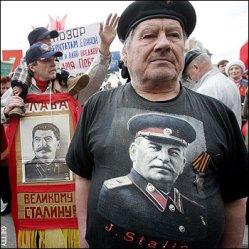Backtracking in Russia
I’m not a political insider, I couldn’t predict what would happen, but I did hear a strong voice of public discontent, and I was genuinely hopeful that there would be positive change. I couldn’t imagine that a year later, I would be wondering which of my colleagues in the human rights movement will be the first to land in jail. But that is what I think about these days.
The Kremlin was alarmed and humiliated by the outpouring of discontent — “how dare they, ungrateful children!” — and right after Putin’s inauguration, the Kremlin started tightening the screws. First with new restrictions on demonstrations, new tougher rules on libel, new restrictions on the Internet. Then came an NGO law that requires groups like mine — groups that are trying to affect public opinion and public policy — to register and publicly identify themselves as “foreign agents” on the preposterous assumption that if we accept even a kopeck of foreign funding it must mean that we are beholden to some foreign master. And if we refuse, we face real prison terms.
They could of course put me in jail; I won’t last a day at my age. But I can’t ask my colleagues to take that kind of risk, and, at the same time, I certainly cannot and will not debase myself and the human rights movement by wearing a label that in Russia can only be understood as marking a traitor and a spy. With Russia’s new treason law the authorities could also put any one of us in jail for providing “assistance” to foreigners that the government thinks is “directed against” Russia’s security.
I don’t know whether the F.S.B. (the new KGB) actually intends to lock up human rights activists as traitors. But I am absolutely certain they mean to send a signal across the country that we should all re-grow our forgotten Soviet instincts of fear and wariness of foreigners — and that includes “foreign” ideas about freedom and democracy — and that officials should feel free to use the threat of criminal charges to keep their critics in line.
The Kremlin is in a bullying mood these days. Just about every day there’s a new screed against the opposition, against the protest movement, new ugly labels for civil society. The government is using television — and now Twitter and social media and proxies — to recreate Soviet-era rhetoric and anti-foreigner hysteria. People are also bombarded with official exclamations about how undemocratic and hypocritical the West is. I think this is mostly for domestic consumption, to appeal to Putin’s conservative base. But it is also an attempt by the leadership to bully its way into removing human rights from the West’s agenda with Russia.
When European Union leaders meet with Putin in Brussels on Friday they must take a very tough stand on human rights and demand an end to this crackdown. The E.U. must make human rights not a side issue, but the main issue. And it must not mince words. There is nothing more important the E.U. could possibly need to talk about with the Russian leadership than the future of the rule of law in its neighbor and strategic partner. The new laws and rhetoric are primitive and they must be reversed.
It will not be a pleasant conversation. But however difficult it is to confront Putin on human rights today, try to imagine what it will be like to discuss these issues a few years from now, when either the crackdown has become even more intense or the path of repression results in a real social explosion. Many will look back to this moment and ask, what did Europe do when Russian human rights defenders called on you in this time of need?
By Lyudmila Alexeyeva
Lyudmila Alexeyeva is a founder and chairwoman of the Moscow Helsinki Group, Russia’s oldest human rights organization.

